Quick Summary:
.NET vs Java are two popular programming languages for creating server-side, online, and desktop applications. Both platforms allow large-scale applications to be built using high-level programming languages. Microsoft .NET and Java are two popular programming languages that have been picked as significant solutions by various companies. Let’s compare the two and see which one is the most excellent fit for your project.
In this blog, we’re going to discuss📝
- What is .NET vs Java?
- Features of DotNet
- Pros and Cons of .NET
- Features of Java
- Pros and Cons of Java
- Head-to-Head Comparison Between .Net and Java
- Key Comparisons Between .Net vs Java
- Non-Technical Comparison
- .NET Vs JAVA: Which Is Better?
- How to Choose Between .NET vs JAVA?
- Where to Use Java?
- Where to Use .NET?
- Companies Using Dotnet and Java
- Final Decision : .NET vs JAVA
.NET and Java are two of the most popular technologies for developing enterprise-level software. .NET, a Microsoft framework, was first released in 2002, while Java, an open-source language, has been around since the mid-1990s. Both technologies are often compared based on factors like scalability, performance, ease of use, community support, and platform compatibility. While they can achieve similar development goals, a common misconception is that both are frameworks. In reality, only .NET is a framework, using ASP.NET for building web applications.
But before diving into the key distinction between Java and .NET, let’s look at the overview of both technologies.
What is .NET vs Java?
Let’s start with understanding the basics of NET vs java:
What is .NET?
.NET developed by Microsoft, was originally a closed-source framework designed for Windows-based applications when it launched in 2002. This restricted the framework to Microsoft’s ecosystem, excluding platforms like Linux, Android, and iOS. However, in 2016, Microsoft introduced .NET Core, an open-source version that expanded its usability across different operating systems. The latest evolution, .NET 5, builds on this by being free of the Windows-only limitations, making it a popular choice for developing projects of various complexities.
Key Insights and Statistics About .NET
- Market Share: W3Techs reports that more than 20% of websites utilize .NET technologies, making it one of the leading platforms in web development.
- Cross-Platform Compatibility: The introduction of .NET Core and .NET 5+ has expanded .NET’s versatility, allowing developers to create applications that run across Windows, macOS, Linux, iOS, and Android.
- Performance: Renowned for its high performance and scalability, .NET is frequently chosen for demanding applications such as gaming, financial systems, and e-commerce platforms.
- Rich Ecosystem: The .NET platform features a robust ecosystem of top .NET libraries, frameworks, and tools, including ASP.NET, Entity Framework, and Xamarin, all of which enhance development speed and efficiency.
- Community Support: An active and extensive .NET developer community offers a wealth of resources, fostering collaboration and continuous innovation within the ecosystem.
- Microsoft Support: As a Microsoft product, .NET benefits from regular updates and long-term support, ensuring its continued growth and relevance.
This framework supports C#, C++, F#, and more programming languages. And adheres to an object-oriented approach. Paradigm .NET also includes the Common Language Runtime, which allows you to run compiled source code.
Features of .NET
- Base class library
- Common Language Runtime Engine
- Interoperability
- Language Independence
- Portability
- Security
- Simplified deployment
Pros and Cons of .NET
Pros of .NET
- Object-oriented programming
- Visual Studio IDE
- Impressive Caching system
- Easier deployment & Maintenance
- Cross-platform development support
- Robust Community Support
- Universal .NET standards
- Automatic Monitoring Support
Cons of .NET
- Prone to Memory leak
- Less developer control
- Stability issues
- Slower than native code
What is Java?
Java is a cross-platform, general-purpose, class-based, and object-oriented programming language.
Key Insights and Statistics About Java:
- Market Share: As of August 2024, Java consistently ranks among the most popular programming languages, according to the Tiobe Index.
- Cross-Platform Compatibility: Java’s “Write Once, Run Anywhere” (WORA) principle allows applications to run on multiple platforms like Windows, macOS, Linux, and embedded systems.
- Enterprise Applications: Java is widely chosen for developing enterprise-level applications due to its robustness, scalability, and top java security best practices & features.
- Mobile Development: Java is the primary language for Android app development, powering most apps on the platform.
- Web Development: Though less dominant in web development compared to JavaScript and Python, Java is used through frameworks like Spring and JavaServer Faces (JSF).
- Big Data and Machine Learning: Java is popular for big data processing and machine learning, with frameworks like Hadoop and Spark commonly used.
- Community and Ecosystem: Java has a large, active community and a vast ecosystem of libraries and frameworks, providing extensive support and resources.
Java is a fascinating language to work with. You develop a program, which is subsequently compiled to bytecode and converted by the JVM to meet the needs of various devices. There are three versions of Java:
- Java EE (Enterprise Edition)
- Java SE (Standard Edition)
- Java ME (Micro Edition)
As a result, a skilled java developer simply needs to write one code for all platforms.
Java is utilized in every industry you can think of, including eCommerce, IoT, finance, and big data, but it hasn’t yet achieved its peak in that field. CLU, Simula67, Lisp, Smalltalk, Ada, C++, C#, Eiffel, Mesa, Modula-3, Oberon, Objective-C, UCSD Pascal, Object Pascal were all influences on Java. Ada 2005, BeanShell, C#, Chapel, Clojure, ECMAScript, Fantom, Gambas, Groovy, Hack, Haxe, J#, Kotlin, PHP, Python, Scala, Seed7, Vala, JavaScript, JS++.
Features of Java
- Reliable Language
- Architecture Neutral
- Supports Interpretation
- Supports Multi-threading
- Offers Garbage Collection
- Develop distributed application
- Platform Independent
Pros and Cons of Java
Pros of Java
- Cheap and economical to maintain
- Enhanced performance
- Multi-threaded
- Object-Oriented Programming
- Secure language
- Simple programming language
Cons of Java
- Average UI/UX
- Less machine interactive
- Memory-consuming
- No Unsigned Types
- Single-Paradigm Language
- Slow performance
Head-to-Head Comparison Between .Net and Java:
| Factors | .NET | Java |
| Definition | .Net is a cross-platform, open-source development framework that can develop various software applications. It works on Windows, macOS, and Linux. | Java is a platform-independent object-oriented programming language that works on any programming language. It provides JVM ( Java Virtual Machine ), which makes it a portable language. |
| Developer | Microsoft | Sun Microsystem |
| Stable Version | 4.8.0 Build 3928 | Java SE 17 |
| File Extension | .Net | Java |
| Efficiency | Java gets converted to machine language only after execution of the code | In .NET, the code is compiled and also run on the system where the code will be initiated |
| Server Components | .NET, COM + Serviced | EJBs |
| GUI Components | .NET Class | Java Beans |
| Talent Pool | 38.4% of professional work with .NET | 35.6% of professional work with Java |
| Language | Supports around 20 languages like: C#, VB.NET, C++, .NET, PHP, Ruby & more | Java is a language by itself and doesn’t support any other language |
| Runtime | CLR | JVM |
| Platforms | .NET, .NET core, ASP.NET, ASP.NET Core, Silverlight | JavaSE, JavaEE |
| Data Access | ADO.NET /OleDB | JDBC |
| Messaging Queue | MSMQ | JMS (MQ Series, etc.), AMQP |
| LINQ Availability | Supports LINQ | Doesn’t support LINQ |
| Naming | ADSI | JNDI |
| XML | System XML | Xerces, Saxon, Jackson, and more. |
| HTTP Engine | IIS | Application Server from Multiple Vendors, WebSphere, WebLogic, WildFly, Glassfish, Tomcat |
| Web services Support | Built-in | Built-in, JAX-WS |
| Unit Testing | Microsoft Unit Testing Framework, JUnit | JUnit |
| Web application Framework | ASP.NET MVC, Spring.NET | Spring, Spring Boot |
| Remoting | SOAP,HTTP,DCOM | RMI-over-IIOP |
| Web Service Support | Built-in | Add-on |
| Web Server Scripting | ASP.NET | JSF |
| Garbage Collection | Provides efficient garbage collection compared to java | Provides less efficient garbage collection than .NET |
| Architecture | .NET supports disconnected architecture | Java supports connected architecture. |
| Exception Handling | Easier exception handling | Harder Exception Handling |
| Community Support | 12.6K stars and 2K stars and forks respectively on GitHub | 11.6K stars and 2.9K stars and forks respectively on GitHub |

Looking to hire .NET developers?
Unleash the boundless potential of your .NET projects with our elite team of expert .NET developers @ Aglowid.
Key comparisons between .Net vs Java
As with any technology, there are going to be some differences when compared to others and .net and java are no different. Following are a few of the critical differences between .net and java. For better understanding, we have divided these differences into technical and non-technical comparisons.
Technical Comparison
Following is a few of the technical comparison that you should keep in mind while you are deciding which one to choose between java vs .net. Let’s kick start this comparison by comparing the performance of both technologies.
.Net Vs Java: Performance
When it comes to performance, java’s syntax is developed from c and c++. Therefore the two languages have a lot in common. On the other hand, Java is platform-agnostic, meaning that its code can be run on any platform.
.NET, on the other hand, provides a general-purpose and straightforward programming language that includes type checking, array bounds, garbage collection, and uninitialized variable checks. This increases the endurance, robustness, and efficiency of your system. Only the features of unchecked and checked expectations are arrayed in Java.
.NET vs JAVA: Operating System
One of the most significant differences between Java and .NET is that JAVA, through its compiler and JRE, can operate on any operating system, as it adheres to the “write once, execute anywhere” approach. .NET, on the other hand, is limited to Windows and its various versions. Although there are a few open-source versions of .NET, they all cater to Windows users. Java’s code can run on any platform, thanks to the JVM. Java has a significant advantage over .NET since it is platform-independent and portable.
JAVA vs .NET: Integrated Development Environment
The top Java IDE comprises three parts: a code editor, a compiler, and a debugger. Eclipse, Intellij Idea, Oracle NetBeans, and, in addition, an Oracle Jdeveloper that is specifically developed for this purpose makes writing and testing code easier. These IDEs include built-in plugins and auto-fill options, which can increase java’s versatility while also providing opportunities for creativity.
The .NET platform, on the other hand, comes with Visual Studio, which aids in the editing, building, and running customization of API behavior through the use of library macros. Apart from that, developers do not need to test IDEs and other tools ahead of time.
Java vs Dotnet: Support for Languages
Java offers cross-platform compatibility with a single programming language, supporting various operating systems and languages like Python, Ruby, and Kotlin. In contrast, the .NET framework supports over 20 programming languages, including C# and C++, but is primarily tailored for the Windows platform. While .NET provides a multi-language environment, it is limited to a single platform, whereas Java supports multiple environments with one language.
Dotnet vs java: Speed of Coding
Although Java has different threads to make handling and processing sequences of instructions easier, .NET remain the leader in terms of coding speed. Because .NET is an object-oriented technology with reusable components, producing the same software in .NET takes less time than designing the same app in Java.
JAVA Vs .NET: Scalability
After the application is fully deployed, both technologies are among the most stable. As a result, both JAVA and .NET are frequently employed for the creation of complex enterprise-level applications.
.NET Vs JAVA: Learning Curve
Both NET vs JAVA are easy to learn. But if compared, it can be a little overwhelming to learn Java given the length of the documentation, whereas learning .NET is comparatively simple.
.NET vs JAVA: Syntax
Following are the syntax of .NET and JAVA
.NET Syntax
using system;
namespace NAMESPACE_NAME
{
class Program
{
static void Main(string[] args)
{
Console.WriteLine("Content_you-want_to_display");
}
}
}Java Syntax
public class class_name
{
public static void main(String[ ] args)
{
System.out.println("Content_you-want_to_display");
}
}.NET vs JAVA: Security
In terms of comparing security, both technologies are secure. They support code signing and enforce an execution sandbox. Java is platform-agnostic, so the chances of security breaches are pretty high can be the reason for significant concern. Whereas, .NET provides more security than compared to java.
.NET vs JAVA: Example
The following are the examples for NET vs JAVA.
.NET
using System;
using System.Collections.Generic;
using System.Linq;
using System.Text;
using System.Threading.Tasks;
namespace ConsoleApp1
{
class Program
{
static void Main(string[] args)
{
Console.WriteLine("Hello, world!");
Console.ReadLine();
}
}
}Java
/* This is a simple Java program.
FileName : "HelloWorld.java". */
public class HelloWorld
{
//Your program begins by calling the main().
//Prints "Hello, World" to the terminal window.
public static void main(String args[])
{
System.out.println("Hello World");
}
}.NET vs. JAVA: Licensing
.NET is a free, open-source platform with no licensing fees and free development tools for Linux, Windows, and macOS. There is no cost for compilers, libraries, and programming languages as open-source programming languages. There are no licensing fees for commercial use.
Starting in 2024, Oracle implemented a subscription model for Java SE (Standard Edition). Although Java 8, 9, 10, 11, and 14 remain free for personal and development use, a subscription is now required for commercial use.
Oracle Java SE Desktop Subscription (On-Premises)
- 1 Year Term Subscription combines Java SE Licensing and Support for use on Desktop deployments.
- €27.75
Oracle Java SE Subscription (On-Premises)
- 1 Year Term Subscription combines Java SE Licensing and Support for use on Desktops, Servers, or Cloud deployments.
- £215.65 – £239.61
Oracle Java Development Tools Support (On-Premises)
- Support for NetBeans, Oracle JDeveloper, and Oracle Enterprise Pack for Eclipse.
- £958.44
Non-Technical Comparison
Following are some of the non-technical comparisons between .Net and Java. Let’s start with popularity.
.NET vs JAVA: Market Overview & Popularity
In 2024, both .NET and Java continue to be widely popular programming languages. Although Google Trends and Stack Overflow Developer Surveys offer insights into their relative popularity, these metrics may vary over time.
Google Trends
In Google trends, we can see the number of queries asked in the last 5 years. It can be seen that as of 25 August 2024, there is an average of 70 queries for java and 4 for. NET. Here you can see that the blue is specified to java whereas red represents .NET.
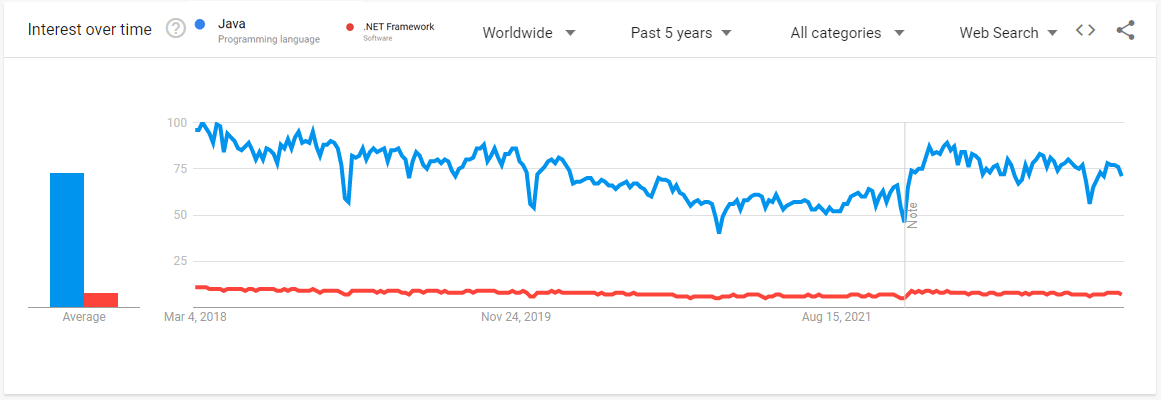
StackOverFlow
The below-mentioned graph gives an insight into the number of queries asked on the StackOverflow regarding both technologies. Here Orange represents Java whereas blue is used to represent .NET.
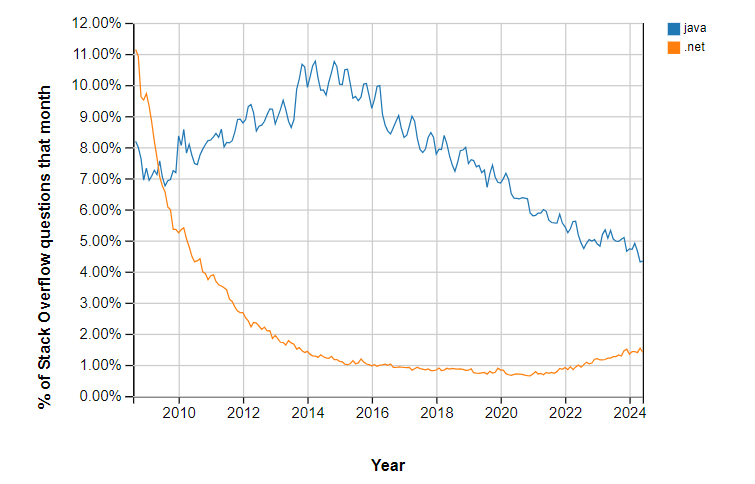
.NET vs JAVA: Time-to-market
The size of your project has a significant impact on this attribute. Your time-to-market for developing a product can be greatly sped up by elements like readily accessible libraries, well-documented technologies, third-party APIs, and a sufficient pool of qualified developers. Everything that makes it possible for you to prevent writing new code from the beginning can be helpful in general. Java and. NET virtually identically matches the necessary code integration and reusability
.NET vs JAVA: Marketshare
According to SimilarTech, .Net powers 1,493,706 webistes, whereas Java supports 58,021 websites.
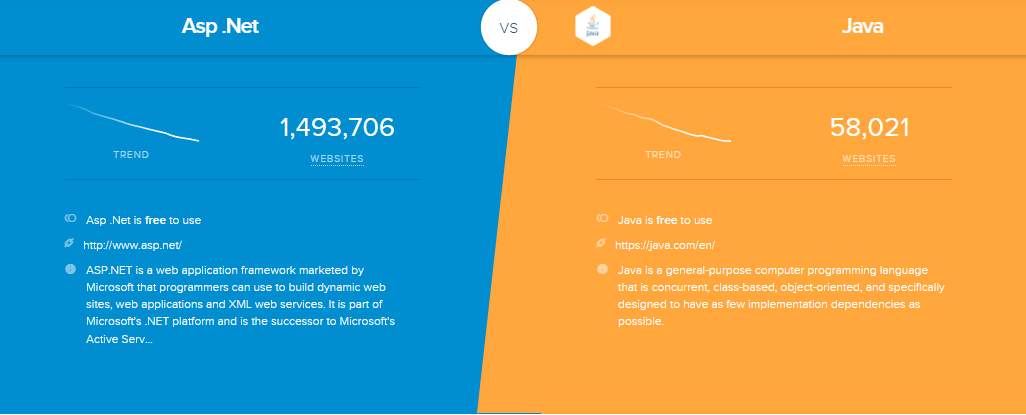
Marketshare by Top Websites
ASP.NET leads across all segments compared to Java. Specifically, ASP.NET holds 5.53% in the Top 10K sites, 7.03% in the Top 100K sites, 6.95% in the Top 1M sites, and 2.13% of the entire web. Java, by contrast, trails significantly with 0.72% in the Top 10K sites, 0.453% in the Top 100K sites, 0.235% in the Top 1M sites, and 0.083% of the entire web.
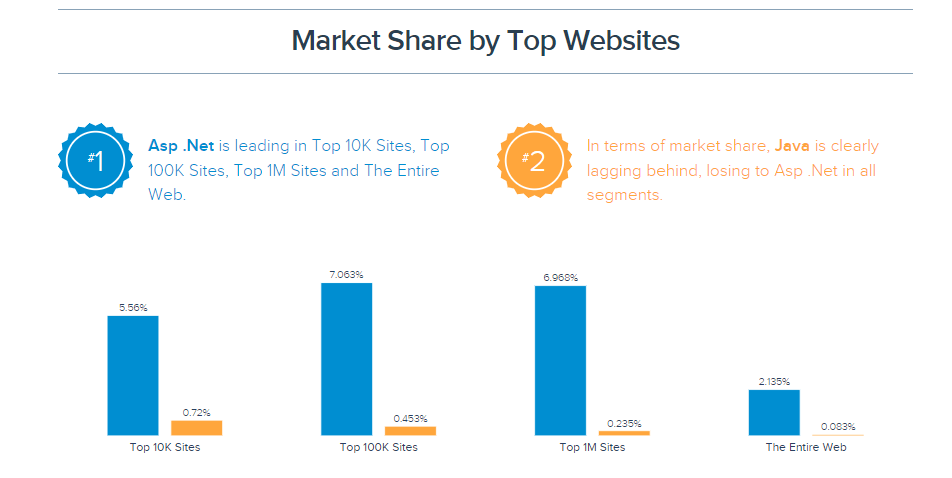
.NET vs Java: Salary (As per talent)
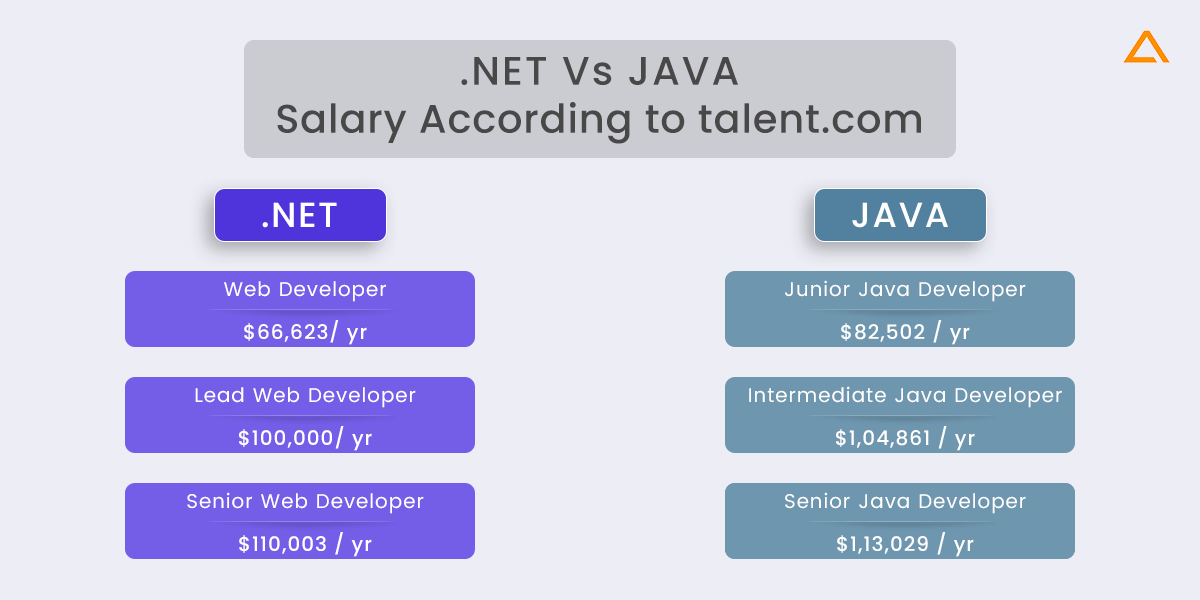
The average income for a Professional .NET Software Developer / Programmer in the United States is $110,000 /yr. The minimum salary is $68,792 /yr and the Maximum salary is $136,539 /yr.
- Junior .NET developer – $52.88/per hour
- Intermediate .NET Developer- $61.32/per hour
- Senior .NET developer- $98.14 /per hour
The average income for a Java Software Developer / Programmer in the United States is $117,239 /yr. The minimum salary is $100,000 /yr and the Maximum salary is $150,000 /yr.
- Junior Java Developer: $56.37/per hour
- Intermediate Java Developer: $70.50/per hour
- Senior Java Developer: $106/per hour
.NET vs Java: Salary (As per LinkedIn)
As of 2024, LinkedIn lists approximately 77,000 results for .NET developers and about 138,000 results for Java developers. These figures reflect the growing demand for both skill sets, with Java developers continuing to have a broader presence
JAVA Vs .NET: Usage Statistics
The following are the usage statistics of .NET vs JAVA according to the w3Tech.

This diagram shows that:
- ASP.NET is used by 5.8% of all the server-side programming language
- ASP.NET is used by 11.9% of all the server-side programming languages we know and that rank in the top 1,000,000 and so on.
- Whereas 4.7% of all websites use Java
- Java is used in 4.8% of all the websites that rank in the top 1,000,000 nd it continues in the same way.
This brings us to the end of the .Net and Java comparison. Now that you have an idea about what are the differences in .NET vs Java. Let’s move forward and see when it is better to use .NET over Java and vice versa.

Looking to hire Java Developers?
Our experienced Java developers @ Aglowid are here to fast-track your project with tailored solutions.
.NET Vs JAVA: Which Is Better?
After going through the difference between the two technologies, let’s find out which one is better while comparing them.
When to use JAVA over .NET
- Java is a free and open-source programming language.
- It has a more significant development community, which means more help forums and documentation.
- Java’s IDEs have more plugins, which saves a lot of time during development.
- JVM (Java, Scala, Clojure, and other languages) is considerably more widely used.
- Exceptions in Java are more manageable.
- Java competes with IoT by providing extensive libraries for developing embedded apps.
- Java is great for developing error-free enterprise software because it has a mature and tight structure and performs run-time checks.
When to use .NET over JAVA
- .NET Framework is ideal for creating Windows-specific systems
- Allows developers to collaborate on the same project using different languages (C#, VB.NET, and C++)
- Debugging is a breeze with .NET
- The deployment of .NET apps are swift and effortless
- The implementation of Ajax is basic and straightforward
- .NET is fantastic for creating user interfaces
- Azure is Microsoft’s cloud IoT and Big Data platform
How to choose between .NET vs JAVA?
- When deciding between these two technologies, the primary consideration should be availability. It’s more difficult to find .NET developers than it is to find Java developers. You should also consider the infrastructure you have available to support the website or app you’re creating with .NET.
- It is a widely held belief that .NET is better suited to developing enterprise-level applications when it comes to open-source compatibility, Java outperforms .NET in terms of interoperability.
- As more businesses use open-source solutions, Java has surpassed .NET in popularity. However, it’s worth noting that Microsoft is attempting to close the gap by integrating with other open-source alternatives.
- Another consideration while deciding between the two is the expense. If you’re going to use Windows-based solutions and other Microsoft products, .NET is the way to go. If you choose Java, though, you’ll need to figure out what additional tools you’ll need for your project.
Where to Use Java?

Java is a general-purpose programming language, which implies it may be used in a variety of fields:
- Android Applications
- Enterprise Applications (widely used in government and consequently on modern applications like Pinterest & Spotify)
- Web Applications (Google Docs, Gmail)
- Softwares (Eclipse, Jira)
- Embedded system
Where to Use .NET?

- Web Applications and Website
- Client Applications
- Gaming
- Enterprise development
Companies using .NET And JAVA
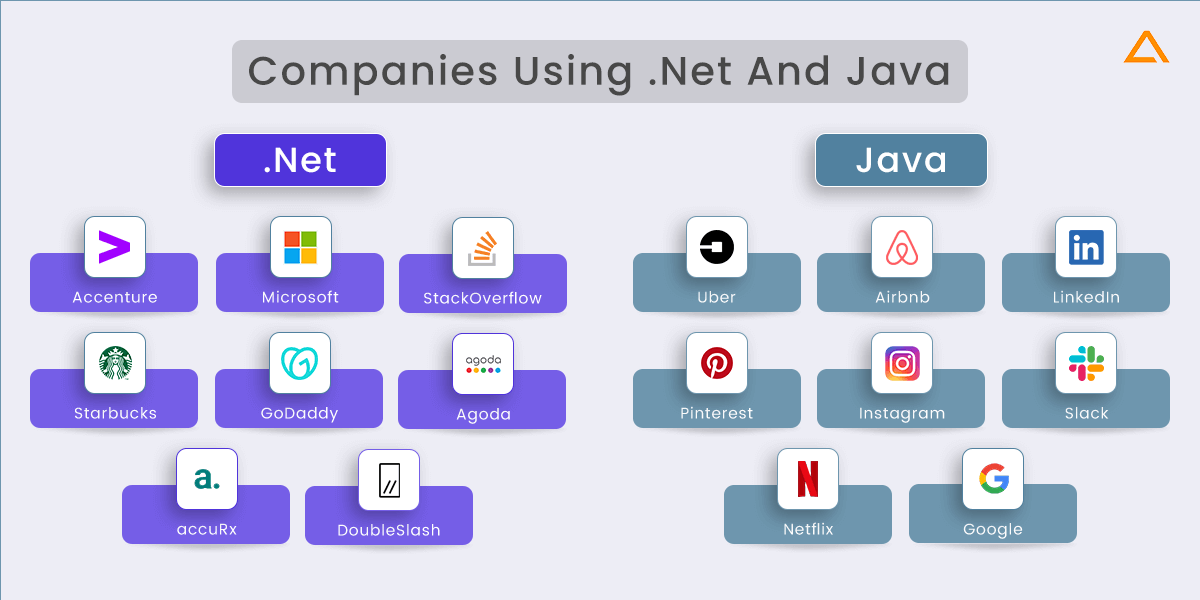
Java
- Uber
- Airbnb
- Slack
- Netflix
.NET
- Accenture
- Microsoft
- StackOverflow
- Starbucks
- GoDaddy
- Agoda
- accuRx
- DoubleSlash
Final Decision : .NET vs JAVA
To summarize, .NET and JAVA are not mutually exclusive. Because both platforms offer nearly identical functionality and target the same market, it all comes down to dedicated developer abilities, underlying infrastructure, interoperability needs, and end-user environments.
Both technologies are helpful for major enterprise-level projects and have comparable applications. Although Java offers a larger community, more documentation, a larger skill pool, and more career opportunities, .NET performs better and includes tools for complicated user interfaces.
Still having trouble deciding which technology is appropriate for your project?. Book a free consultation with our experts, ensuring that you are directed in the appropriate direction and that your project is taken care of.
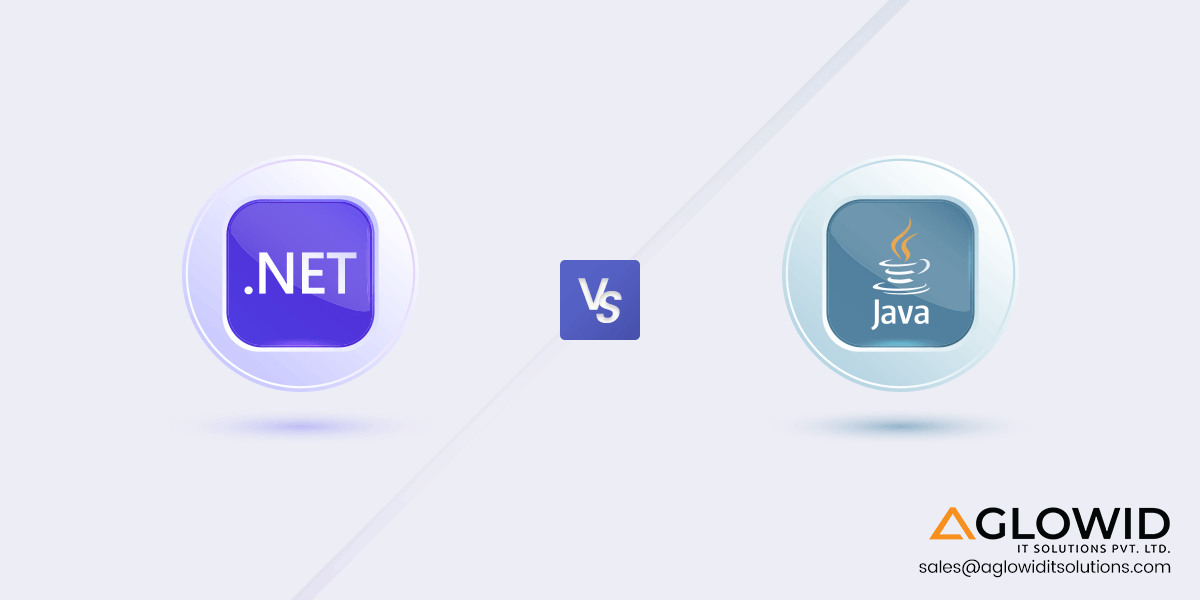




 Say
Say